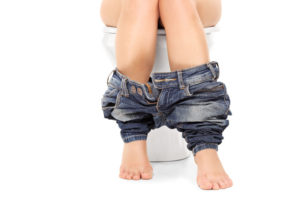IBS is often a frustrating and confusing diagnosis for most individuals. There tends to be a lot of misinformation and taboo around it as well. As this is the beginning of my blogging journey on digestive health, I thought outlining the facts and clearing up the confusion surrounding IBS would be a great place to start!
IBS stands for Irritable Bowel Syndrome. It is a functional gut disorder. Which basically means the gut isn’t functioning properly, or as well as it could be.
The Facts:
Back when I was training to become a dietitian we were taught that IBS isn’t well understood and that it is a fall back diagnosis. You may have heard this yourself even. But let me tell you, this is not true! Or at least not anymore. Every year we are learning more and more about it! I can’t lie and say we have all the answers yet. There is still so much we don’t know. But research is always being done, so hopefully one day we will have all the answers.
Symptoms of IBS:
Symptoms of IBS vary drastically from person to person and can also vary from day to day. The most common symptoms of IBS is abdominal pain in association with changes in bowel habits (diarrhea and/or constipation).
- Abdominal pain: is typically described as crampy and varies in intensity. Some people notice an increase of pain related to emotional stress and eating certain foods. Having a bowel movement may relieve the pain. Some women also report a worsening of symptoms in association with their menstrual cycle.
- Changes in bowel habits: this can include diarrhea, constipation, or an alternating between the two.
- Diarrhea: frequent loose stools, usually occurring during the daytime, and most often during the morning or after meals. It is often preceded by a sense of extreme urgency and followed by a feeling of incomplete emptying. Some people with IBS also notice a mucous discharge with diarrhea.
- Constipation: infrequent, often hard and pellet-shaped stool. Can be intermittent and last for days. May also be followed by a feeling of incomplete emptying when rectum is actually empty. This faulty sensation can lead to straining and sitting on the toilet for prolonged periods of time.
- Other symptoms: include bloating, gas, and belching
Diagnosis:
As I mentioned, IBS is not a fall back diagnosis. There are diagnostic criteria for it! The most used criteria is called the ROME IV Criteria:
- Recurrent abdominal pain, on average, at least one day per week in the last three months, associated with two or more of the following criteria:
- Related to defecation
- Associated with a change in stool frequency
- Associated with a change in stool form (appearance)
This may be different than what you have previously read. The criteria was just recently updated from the ROME III. Other criteria lists may include other symptoms such as: relief of pain with bowel movements, looser and more frequent stools with the onset of pain, passage of mucus, and a sense of incomplete emptying.
Over all though, IBS looks different for everyone! Which also adds to the confusion. There are four different subtypes as well: IBS with predominate constipation, IBS with predominate diarrhea, IBS with mixed bowel habits, and IBS unclassified.
There is no test for IBS, but your doctor might wish to complete tests to rule out other conditions. These tests may involve blood work, endoscopy, or a colonoscopy. Typically though, testing is usually only done if the individual has any “alarm features”:
- Onset of symptoms after age 50 years
- Rectal bleeding
- Nocturnal diarrhea
- Progressive abdominal pain
- Unexplained weight loss
- Laboratory abnormalities
- Family history of IBD, Celiac, or colorectal cancer
I hope you have found this information helpful. I can’t wait for the following weeks when I continue this topic with a discussion of different treatments and what is actually occurring in our bodies that results in the symptoms of IBS.
Disclaimer: This blog is meant to be informative and supportive and in no way be a substitute for medical advice. If you have IBS or you suspect that you have IBS you should speak with your physician about your symptoms and treatment options. I also recommend working with a registered dietitian before making any changes to your diet.
